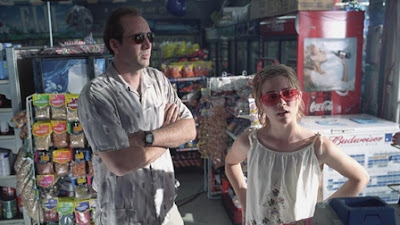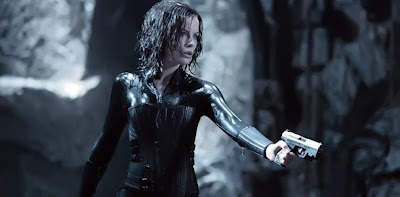When it comes to sequels, movie reviewers are ordinarily encouraged to revisit an impending film's universe before even thinking about seeing the follow-up, but that alas is a practice I overlooked when it came to observing "Jeepers Creepers 2." According to a stack of promotional materials, my only source of foreknowledge in the inevitable journey to seeing this product, the film's predecessor sets a scenario that is more or less a platform for countless franchise installments; in other words, it suggests that any and all future additions to a series will either a) depend on prior events for any plot development, or b) simply repeat the same exact setup over and over again without adding anything other than higher body counts. We can usually get away with bypassing older series installments if the latter selection is implored (after all, what's the significance in revisiting a series if it is merely repeating itself?), but on the rare occasions that sequels are advancements of older stories, acquaintance with the original premise is sometimes essential.
Friday, September 26, 2003
Matchstick Men / ***1/2 (2003)
Poor ol' Roy just hasn't got a clue. A man married to his work is bound not to have much of a personal life, but when the person in question is actually a very successful manipulator and con artist, you'd expect him or her to have some kind of free time to spend on developing social skills. So is not the case with this reclusive dude, however; aside from being an incessant neat freak who obsesses over the slightest possibility of germs contaminating his environment, he's short-fused, pigheaded and outwardly pitiful to himself and to all those who cross his path. And yet we admire him anyway, because once you peel away the hypertensive demeanor and most of those erratic impulses of his, you have a sweet, charming and lovable guy living underneath. It's not everyday you find yourself rooting for the con man.
Underworld / ***1/2 (2003)
Len Wiseman's "Underworld" launches with a premise that is easily one of the most inspired concerning vampires and werewolves since the creatures themselves first appeared on the big screen. In the murkiest corners of a shadowed gothic metropolis, the familiar horror film adversaries are driven not by bloodlust, but by their own personal struggle to endure. For a thousand years, the movie's heroine tells us in the opening shot, both the vampires and the werewolves (referred to as "Lycans" through most of the picture) have been in a heated war with each other, one that reached catastrophic proportions for the werewolves at one point when one of their most important leaders was killed by the opposition. Thus, in a state of fragmentation, the Lycans scattered into the city as the vampires assumed control of the highest point in the food chain, and though their control has gone fairly unchallenged since the days when the werewolf society was crippled, fear of a resistance persists and the vampires are encouraged to destroy every last breathing creature they can find.
Subscribe to:
Posts (Atom)



